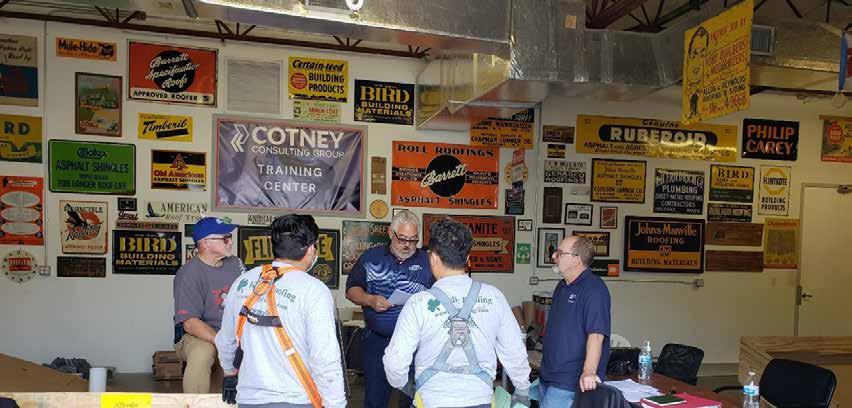
16 minute read
Training, Codes, Legislation and Research are on FRSA’s Horizon
Mike Silvers, CPRC, Owner of Silvers Systems Inc. and FRSA Technical Director
Like many of you, I was thrilled to see that the next FRSA Board of Directors meeting in April will be an in-person event. For many of us this is another step in the all-too-slow return to somewhat normal. Virtual meetings have allowed our work to continue but are lacking in the face-to-face exchanges of information and viewpoints that in-person meetings offer. These meetings and the Convention have been the life blood of our Association.
A few days before this writing I received my COVID vaccination. I was among the last in my age group to receive it but was very happy and somewhat relieved to get it. I guess there are a few advantages of being an old guy – I’m not complaining about getting older mind you – I certainly prefer it to the alternative.
Beginning to put the effects of the virus in the rearview mirror is, in many ways, a new starting point for what lies ahead. With that in mind, I want to lay out just some of the opportunities and challenges that await FRSA and the Florida roofing industry it represents. Training
As we rebound and start rehiring, attracting new folks to the industry, providing appropriate training will be more important than ever. Roofing is becoming more complex every year. New materials and application methods, along with more complex and stringent building codes, demand that we as an industry respond by training our workforce.
Recently, I had the opportunity to attend a pilot testing program for the National Roofing Contractors Association’s (NRCA) ProCertification for Clay and Concrete Tile Systems held at Trent Cotney’s impressive facility in Tampa. If you are into cars, and who’s not, you know how impressive early transportation advertising signs can be. If you are into roofing, which you must be if you’re reading this, Trent’s shop area behind his offices is every bit as impressive. His collection of roofing-related signs and memorabilia from the twentieth century was a stroll down memory lane. Thanks, Trent, for all you do.
Back to the tile testing. Once those participating in one of the ProCertification modules completes a course, he or she will need to take a final hands-on exam demonstrating experience and knowledge of that particular module. A qualified accessor oversees the hands-on demonstration. Attending as an accessor was Trent’s instructor and master mockup fabricator, Jim Montague. NRCA had a great group there that included: John Schehl, Jared Ribble, Jon Goodman and Frank Perna. Representing Eagle Roofing Products and FRSA was the always willing and invaluable Manny Oyola. He was not only helping with the students' hands-on roof tile evaluation but was also acting as an interpreter. FRSA is
NRCA ProCertification tile testing.




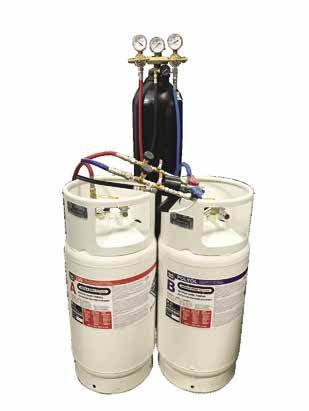
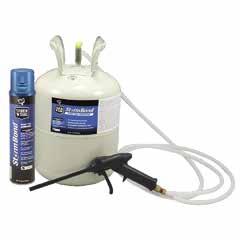
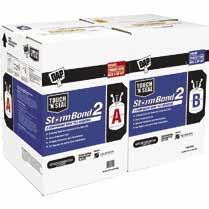
FRSA Codes Committee meeting.
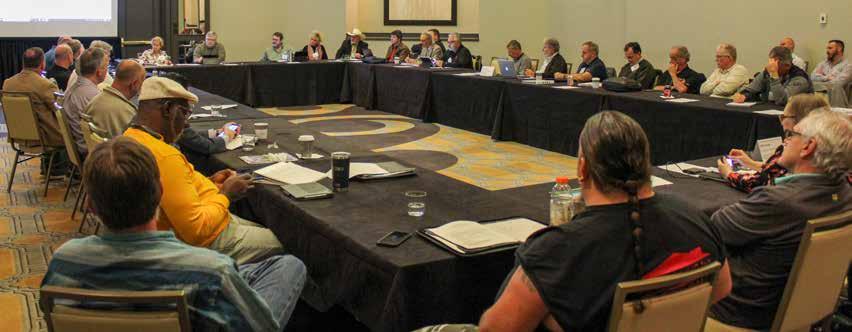
hoping to partner with NRCA to further develop and implement this program in Florida.
FRSA’s Educational Foundation has continued to offer both virtual and in-person roofing-specific seminars. Recommended social distancing and masking procedures have been implemented during in-person seminars that have taken place in the Training Center at FRSA’s new headquarters building in Orlando. The in-person seminars offer two hours of continuing education (CE) credit that covers major roofing-related changes in the 7th Edition (2020) Florida Building Code (FBC). I have served as the instructor for this portion of the seminars. An additional hour of CE covers the changes in the new FRSA-TRI (Tile Roofing Industry Alliance) Florida High Wind Concrete and Clay Installation Manual 6th Edition. The instructor for this portion of the seminars is Manny Oyola. The industry is very fortunate to have Manny’s continued dedication.
The FBC and tile manual seminars, as well as many more great seminars, will be offered during FRSA's 99th Annual Convention and the Florida Roofing & Sheet Metal Expo (July 21-23, 2021). We have a very knowledgeable and interesting group
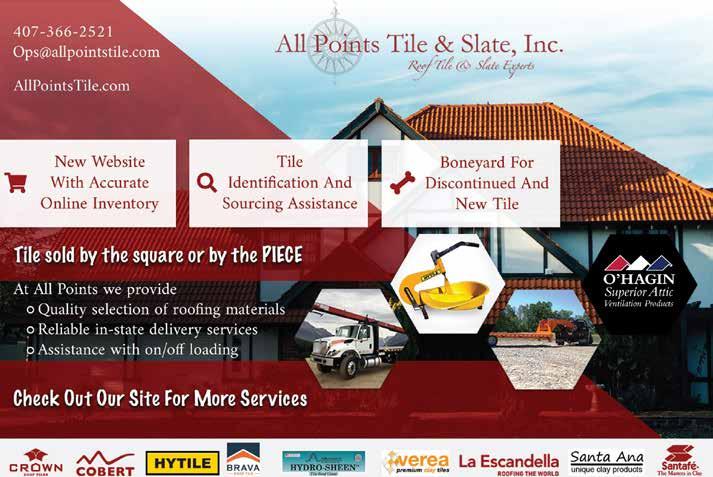
Roofing Apprenticeship participants learning via Zoom meetings

of speakers and instructors who are dedicated to improving their industry. I, for one, can’t wait.
We have also developed a one-hour version of the 2020 FBC updates that we recently presented for two of our affiliates as a non-CE webinar. I am available to schedule this course for other affiliates virtually and, hopefully very soon, in-person. If you’re interested, contact me to arrange possible presentations for your group.
Manny and I have also recently presented an early morning seminar and a luncheon seminar for the Palm Beach County Building Officials on both the tile manual and the one-hour FBC changes. Our presentations seemed to be well received. We will be planning similar events in the near future.
In April, we will be presenting a recruitment and hands-on training course at the Future Builders of America (FBA) Summit. This is a great opportunity to expose young people who already have an interest in construction to the roofing industry and the



















many possible career paths that it offers.
The Associated Builders and Contractors (ABC) and FRSA Apprenticeship Program is proceeding very well, especially when you consider that the majority of the classes are being presented via Zoom meetings. We have a great group of students. Clay Thomas of Advanced Roofing, Ft. Lauderdale is doing most of the heavy lifting here. I jump in when I’m available to help out. Across the state, there are several of these programs taking place with a great team of instructors and volunteers.
Clay Thomas and Tyler Allwood, Eagle Roofing Products, are among some FRSA regulars who are serving as subject matter experts (SME) for the development of a college credit roofing curriculum for the National Center for Construction Education and Research (NCCER). I am happy to be a part of this great group of SME from across the country who are participating in this endeavor.
FRSA is also working on an entry level training program titled FRSA Introduction to Roofing Technology. It is coming along nicely thanks to the efforts of the Worker Training Subcommittee. Legislation
Many of this year’s slate of legislative bills involve items that effect our industry and are technical in nature. Property insurance reform in particular is a hot topic. Many of these bills are meant to address the growing number and cost of water damage and roof replacement claims. Our Codes Committee and Codes Subcommittee are working closely with our Governmental Affairs Committee and our lobbyist, Chris Dawson, to offer our advice and assistance, which includes coordinating efforts with other trade groups we regularly work with on code issues. There are also other proposed bills that effect the building code and its enforcement. Of particular interest is limiting the enforcement of local amendments that have not been properly adopted and haven’t been provided to the Florida Building Commission staff for inclusion as local amendments. FRSA’s lobbying efforts also include construction defects and workers’ compensation bills. Chris is becoming more familiar with our industry and excelling while doing so. We’re lucky to have him on our team. Declaratory Statement
In March, FRSA, through our legal team from Cotney Attorneys and Consultants, submitted a motion to intervene in a petition before the Florida Building Commission (FBC) regarding the Florida Building Code’s threshold limit for the percentage of a roof area that may be repaired before replacement of a complete roof covering is required.
The Petition for Declaratory Statement (DS 2021007) was seeking the Commission’s position on whether the replacement of non-damaged areas of a roof should be computed within the 25 percent threshold limit set forth in 706.1.1, Florida Building Code. FRSA joined the petitioner, SDii Global Corporation, in its position that repair of non-damaged areas of a roof should not be computed within the 25 percent threshold limit.
FRSA’s motion supported the petitioner’s interpretation of the Building Code, noting that it is a reasonable and logical interpretation of the Code. FRSA pointed out that a contrary interpretation of the Code would result in immense economic waist, unnecessarily burden property owners and restrict roofing contractors’ discretion to salvage otherwise viable roofing systems. FBC staff analysis agreed with the petitioner and has forwarded the petition to the Commission for a vote in April.
Trent’s team also represents FRSA, and the industry, before other regulatory boards such as the Construction Industry Licensing Board (CILB) and the Department of Business and Professional Regulation (DBPR). Much thanks to Trent and his team for all their hard work! Building Codes
While we are still digesting the many changes in the 2020 FBC and then diligently working to inform our members and others about them, we are already deep into our next triennial cycle code adoption process. You can see by reviewing the Workplan for the 8th Edition (2023) FBC Update Development Tasks (pages 24-25) that it is an involved and ongoing process. The first task is to review changes brought into our code from the International Building Code (IBC). Which IBC changes eventually will be presented to the FBC Technical Advisory Committees (TACs) and then to the Commission, will be determined by the Commission staff. We have reviewed the roofing-related changes in the 2021 IBC, which allows us to see what might be coming in May and helps us to respond accordingly. Our Codes Committees have already began discussing and developing code change modifications that FRSA will present beginning in January 2022. All other proposed modifications presented by the public will also be submitted by then as well. At that point, we will develop and present our positions on all of these modifications. Between then and March 2023, we will testify and attempt to have our positions included in the new code. Reviewing and tracking these changes is important and takes a group effort. We are fortunate to have knowledgeable and involved volunteers on both our Codes Committee and Subcommittee to help in this effort.
The Codes Committee recommended and the Educational Foundation Trustees approved funding for a research project to test the combination of a nailed #30 and self-adhering tile underlayment to determine the resistance to uplift pressure using several different attachment patterns and products. Our goal is to determine if a nailed #30 is a suitable anchor (base) sheet for this particular underlayment system. The task force working on this project includes Greg Keeler, Owens Corning, Manny Oyola and myself. We will begin testing at the PRI Tampa facility in April. The 6th Edition FRSA-TRI Florida High Wind Concrete and Clay Tile Installation Manual requires that all tile underlayments meet the design pressures for the structures they are installed on. The system we are testing is a prescriptive method in use in Florida that very well may not meet those pressures. More to come on this subject. Volunteers and Staff
FRSA is very privileged to have so many dedicated volunteers that are truly interested in improving the roofing industry. You’ll see so many familiar faces attending multiple committee meetings covering very different industry issues. But all of the committees have the same overall goal, to improve our Association as well as the industry and trade that it represents.
Much like our volunteers, our staff works across many different areas and addresses many different issues. We depend on each other’s strengths, knowledge and expertise to continue moving our members’ goals forward. I know we are all proud to represent FRSA and are ready to meet the upcoming challenges.
FRM
Mike Silvers, CPRC is owner of Silvers Systems Inc. and is consulting with FRSA as Director of Technical Services. Mike is an FRSA Past President, Life Member and Campanella Award recipient and brings over 40 years of industry knowledge and experience to FRSA’s team.
The Geocel® All-Pro Lineup

Whatever your roof needs, we’ve got the right sealant for the job.
2300® Construction Tripolymer Sealant
High-performance sealant for use on common roofing substrates. • Exceptional flexibility and adhesion • UV and mildew resistant • Paintable • Resealable
3300®/3500 Professional Polyurethane Sealants
High-performance sealants that withstand adverse weather conditions. • Stays flexible with minimal shrinkage • Primer adhesion on most substrates • 3500: Ideal for both bonding and sealing applications • Paintable
4350 Metal Roofing & Siding Construction Sealant
Provides a strong, longlasting bond and can be applied in extreme wet or dry conditions down to 0 °F. • Permanently flexible • Watertight seal • No shrinkage • Shades to match popular metal roof colors
8th Edition (2023) Update to the Florida Building Code—
Tasks
Selection of the model codes:
2020 NEC published and available to the public; 2021 International Codes published and available to the public; Commission selects 2021 I-Codes model codes and 2020 NEC to conduct its review
Review of the model code changes:
In coordination with ICC, staff post complete listing of the code changes to the I-Codes online Staff post on Commission website/Building Code Information System (BCIS) analysis of the 2021 I-Code change to provide for identification of the following: ■ Provisions which overlap with the provisions of the FBC ■ Provisions which correlate directly with the provisions of the FBC ■ Provisions which provide for energy efficiency standards that meet or exceed the national energy standards mandated by Title III of the Energy Conservation and Protection Act ■ Provisions which are necessary to maintain eligibility for federal funding and discounts from the
National Flood Insurance Program, the Federal Emergency management Agency, or the United
States Department of Housing and Urban Development Residential Construction Cost Impact Workgroup (RCCIWG) reviews the 2021 changes to the International Residential Code (IRC) and provides comments to the Commissions TACs on impactful code changes. RCCIWG meeting on-site meeting (TBD) 45 day public review and comment period ends (By Rule -45 day min before TAC review) Staff post on Commission website analysis of the 2021 I-Code changes with public comments (Tracking Charts and code change monographs)
TACs review the 2021 changes to the I-Codes and make recommendations to the Commission regarding those changes as follows:
■ That the Commission rejects certain model code provisions by consent agenda. ■ (Due to such issues as being unnecessary, negatively impacting the level of public health, safety, or general welfare provided by an existing Florida Building Code provision, diminishing the requirements of provisions related to wind resistance or water intrusion, unnecessarily imposing additional costs, or potentially requiring modification or further investigation before being adopted for use in this state) ■ That the Commission approves certain model code provisions by consent agenda. ■ (When considering whether to recommend inclusion on a consent agenda for approval, the TACs shall consider such criteria as whether the model code provisions are editorial or organizational in nature, correct an error, provide clarification, provide for alternative design methods, improve the effectiveness of the code, are uncontroversial to affected stakeholders, or are required by law.) ■ That the Commission approve or reject certain model code provisions after considering them individually ■ (When recommending individual consideration of model code updates, the TACs shall consider such criteria as whether the update has the potential to impose significant costs, cause confusion or regulatory difficulty, may be unnecessary, is highly controversial to affected stakeholders, or requires further evaluation.) TACs meetings on site – TBD
Staff post TACs recommendations online for further public review
Deadline for requesting amendments (2021 I-Codes changes) to be pulled of the consent agenda for individual consideration Commission considers TACs recommendations regarding the latest changes to the model codes – on site meeting (TBD) Schedule
8/25/2019 January 2021 2/9/2021
2/25/2021 5/17/2021
TBD
7/1/2021 8/2/2021
9/27-28/2021
10/15/2021 11/19/2021
12/14-15/2021
Tasks Staff post Commissions recommendations online
Proposed modification to the foundation code and Commissions approved I-Codes changes
Period for public to propose modifications to the 7th Edition (2020) FBC and the Commissions approved I-Codes changes Proposed amendments reviewed by staff and posted to the Commission website 1st 45 day comment period ends (By law -45 day min before TAC review) Staff post on Commission website proposed code changes (Tracking Charts and Detail Reports) TACs consider proposed modifications (1st 45 day comment period) TACs meetings – 4-day on-site meetings TACs recommendations posted to the website Starting date for the 2nd 45 day comment period Residential Construction Cost Impact Workgroup (RCCIWG) reviews the TACs recommendations with regard to the proposed modifications to the Florida Residential Code (FRC) and provides comments to the TACs/Commission on impactful code changes. RCCIWG meeting on-site meeting (TBD) 2nd 45 day comment period ends (by law 45 day min before Commission review) Staff post on Commission website proposed code changes with comments (Tracking Chats and Details Reports) TACs consider public comments on their actions on the proposed mods TACs meetings 4-day meetings [2-day on-site (TBD) and 2 day via conference/webinar] As needed and as applicable Staff post on Commission website TACs consideration of public comments Commission considers TAC recommendations (2nd 45 day comment period) Commission 2-day meeting 8th Edition (2023) FBC (7th Edition (2020) FBC, Florida Supplement and Commissions approved I-Codes) posted online
Provide Supplements to ICC for integration into the 7th Edition (2020) FBC
TACs review comments to Rule Development Workshop of March 13, 2020 and make recommendations to the Commission TACs meetings – 3-day on-site meetings and 3-day conference call/webinar meetings
Rule Development Workshop
Commission – 1-day meeting Integrated Draft 8th Edition (2023) FBC Posted online Hearing on 8th Edition (2023) FBC to consider received comments Final Rule Hearing on 8th Edition (2023) FBC/Commission approves final version of Code 8th Edition (2023) Florida Fire Prevention Code available in final format Rule Submitted to Secretary of State and Supplement/Integrated posted online – subject to addressing all JAPCs concerns Schedule 1/3/2022
1/4/2022 2/15/2022 3/3/2022 4/18/2022 5/2/2022 6/20-24/2022
7/12/2022 TBD
8/26/2022 9/21/2022
10/11-14/2022
11/10/2022 12/13-14/2022
1/19/2023
2/22-24/2023
March 13, 2023
May 22, 2023 TBD TBD
TBD
Final FBC -PDF posted Printed Code available – subject to negotiation with ICC 2023 FBC (8th Edition) effective date (6 months after publication)
TBD TBD 12/31/2023 553.73(7)(e) A rule updating the Florida Building Code in accordance with this subsection shall take effect no sooner than 6 months after publication of the updated code. Any amendment to the Florida Building Code which is adopted upon a finding by the commission that the amendment is necessary to protect the public from immediate threat of harm takes effect immediately. Source: https://www.floridabuilding.org/fbc/commission/FBC_0221/Commission/2023_FBC_Workplan.htm



